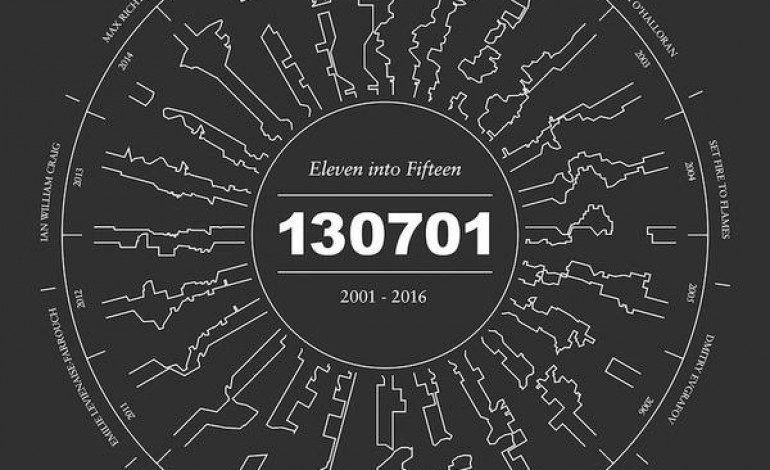

A Satisfying Hors d’ouevre
Classical was dead. Long operating on the bourgeoisie corners of society. Lauded only in the mythic concert halls, derided by the rock loving youth. In recent years, something finally changed, the introduction of more varied instrumentation into indie rock rekindled a long smoldering fire, and the post classical movement was born. Over the past fifteen years the 130701 imprint by FatCat Records has played a pivotal role in the burgeoning post classical scene, housing artists like Set Fire to Flames and Hauschka, creating an open space for innovative artists to explore their creativity. In honor of their fifteen year anniversary 130701 has released Eleven Into Fifteen: A 130701 Compilation, an often peculiar but engaging collection of oddities and unreleased material from some of their most iconic artists.
The album begins with Olivier Alaray’s “Yangtze”, a cool quiet song, reminiscent of floating on a Louisiana Bayou. The beauty is often punctuated by clips of hissing static that slowly wash away the calming effect with an ever increasing sense of wariness. Unfortunately the track never fully capitalizes on or develops these emotions, opting to close out far too soon for the full impact to materialize. The second track “Constreaux No.2” by Dustin O’Halloran is a clear standout from the compilation, a vividly therapeutic track. Instantly listenable from first exposure it neither begs to be ignored nor dissected and is content to just be, melding itself perfectly into the soundtrack of any day. The hammer instruments add a layer of texture into the composition that make its rather repetitive structure extremely engaging. On “Anthem” Dmitry Evgrafov pulls out a fairly standard piano piece. While the song suffers from no major flaws, nothing ever truly jumps out to grab the listener, relegating this track to remain forgettable in comparison to much of the album. “barn levitate” by Set Fire to Flames serves as the centerpiece of the album. It successfully co-opts much of what makes the music of Godspeed You! Black Emperor so engaging. Incorporating moments of profound silence punctuated by bursts of cacophony that rises into howling crescendos that undulate throughout the track. It lulls the listener into a false sense of security by repeating single notes and measures for minutes at a time before blasting into an uproar of noise and fury, creating an absolutely stunning experience that clearly stands out as one of the most engaging existences on the album. “June” by Resina has the difficult task of following “barn levitate” and unfortunately cannot live up to the pressure. The whole track evokes a soft feeling of springtime, of life and vibrancy; it’s an exercise in waking up. However, the instruments never sound fully warm and the piece is reminiscent of coming in early to a symphony warm up, nothing ever seems to evolve, content to linger in its solitary sound. “Quiet” by Hauschka is another major standout from the compilation. The song is a relatively calm piano piece accompanied by a strange rattling sound, like checkers being batted about a tile floor by a cat, or the light tapping of a drumstick on hard plastic. The track picks up pace in some brief sections but never loses its relaxing allure, standing as a clear reminder why Hauschka is one of the biggest players in the post classical movement. One of the last big standouts from the album is “Bach Study” by Max Richter. On this track, Richter takes a slow moving orchestra and turns it into something of an event, each note lingers on endlessly and deeply, reaching into the depths of the soul. About halfway through the piece a deep shaking rumble buzzes through the listeners headphones, punctuating the piece with a full and aching texture that adds so much more to the song than it has any right to and leaving a profound impact on the structure of the entire album.
No matter how great, compilations are always taxing as a complete listening experience. There’s a constant and pervasive sense of disconnect from track to track that yanks the listener from the emotional state that a song has spent so long creating, and thrusts the listener into a whole new set of emotions with no recovery time a problem that is excessively noticeable on this compilation. Post classical is a genre that has always relied on the emotional impact of classical combined with the brevity of modern music, because of this the emotional impact and atmospheric development of each track is aggressively concentrated. This makes for a jarring transition between each section of the album. Despite this glaring flaw, the album still stands head and shoulders above most post classical compilations, it makes a conscious, if somewhat ineffective, effort to avoid the jarring transitions between tracks and manages to compile some of the best post classical tracks being made today. This album then is no masterpiece or main course, instead serving as a well-crafted hors d’oeuvre that successfully whets the listener’s appetite for the next fifteen years of post-classical music.
